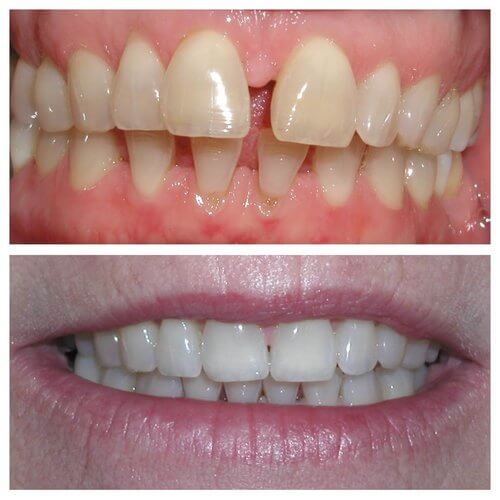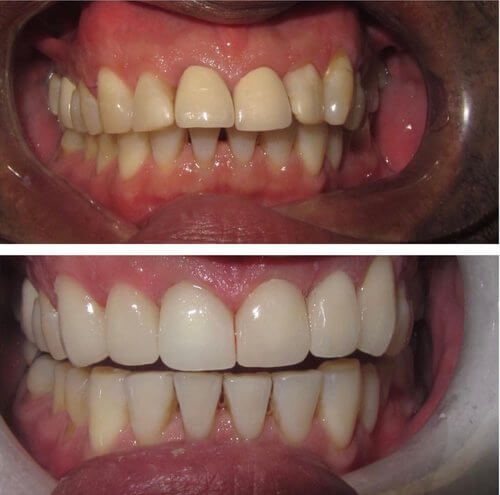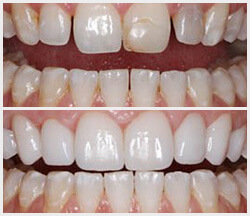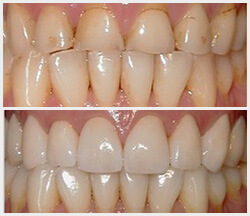Protecting Your Smile: Early Intervention for Gum Disease
Gum disease is a common oral health condition that affects millions of people worldwide. It’s a progressive disease that can lead to tooth loss and other serious health complications if left untreated. Gum disease develops in stages, starting with gingivitis and progressing to periodontitis.
Understanding the stages of gum disease and its symptoms is essential for early detection and effective treatment. Our dentists in Staten Island have created a helpful guide so you can understand the varying stages of periodontal disease.
Gum Disease Stages
Gingivitis
The first stage of gum disease is gingivitis, which is a mild inflammation of the gums caused by plaque buildup around the teeth. Symptoms of gingivitis include red, swollen, and tender gums that bleed easily when brushing or flossing. However, gingivitis can often be reversed with proper oral hygiene practices such as brushing twice a day, flossing daily, and regular dental cleanings.
If you have noticed signs of gingivitis, schedule an appointment with your dentist as soon as possible. With early intervention, gingivitis can be easily treated before it progresses to more severe stages of gum disease.
Early Periodontitis
If left untreated, gingivitis can progress to early periodontitis, which is characterized by a more significant infection that begins to affect the bone supporting the teeth. Symptoms of early periodontitis include receding gums, bad breath, and increased sensitivity to hot and cold temperatures. At this stage, the bacteria have begun to penetrate the deeper layers of gum tissue and bone, causing irreversible damage.
To treat early periodontitis, our Staten Island dentists may recommend scaling and root planing, which involves removing plaque and tartar buildup from beneath the gum line and smoothing the tooth root surfaces.
Moderate Periodontitis
Moderate periodontitis is the third stage of gum disease, and it’s characterized by significant bone loss and gum recession. At this stage, teeth may become loose, and there may be noticeable gaps between the teeth. In addition to the symptoms of early periodontitis, patients with moderate periodontitis may experience pain and discomfort while chewing.
Treatment for moderate periodontitis typically involves a combination of scaling and root planing, antibiotic therapy, and possible surgical intervention. Your dentist may recommend a bone graft or guided tissue regeneration procedure to help regenerate lost bone and gum tissue.
Advanced Periodontitis
The final stage of gum disease is advanced periodontitis, which is characterized by significant bone loss and tooth mobility. At this stage, teeth may need to be extracted, and patients may require extensive reconstructive procedures to restore their oral health.
Symptoms of advanced periodontitis include severe pain, swelling, and pus discharge from the gums. Treatment options may include periodontal surgery, bone grafts, and dental implants.
Frequently Asked Questions:
Can gum disease be cured?
While more advanced stages of gum disease cannot be completely cured, it can be managed and controlled through proper oral hygiene practices and professional dental care. With early intervention, gingivitis can often be reversed, and the progression of gum disease can be slowed or stopped.
What are the risk factors for gum disease?
Risk factors for gum disease include poor oral hygiene, smoking, genetics, hormonal changes, certain medications, and health conditions such as diabetes.
Can gum disease affect my overall health?
Yes, there’s growing evidence to suggest that gum disease may be linked to several systemic health conditions, including heart disease, stroke, and diabetes. This is because the bacteria that cause gum disease can enter the bloodstream and potentially cause inflammation throughout the body. Managing your gum health is an important part of maintaining your overall health and well-being.
Are You at Risk for Gum Disease? Schedule a Consultation!
If you’re experiencing symptoms of gum disease or want to learn more about how to prevent it, schedule an appointment at our dental office in Staten Island today. Our experienced dental team can provide a comprehensive examination and create a personalized treatment plan tailored to your individual needs.
Don’t let gum disease go untreated and risk the potential for serious health complications. Contact us at (718) 948-5111 to schedule your appointment and take the first step toward achieving optimal oral health.



Insurance
We accept many insurances. Please contact one of our Insurance Coordinators to discuss your dental coverage plan.
(718) 948 5111
appointments@sidental.com
Open 7 days a week
Reviews
The dentists are absolutely excellent…
“I have been going here for years. The dentists are absolutely excellent and they always have an appointment available that fits into a busy schedule. I also completed invisilgn and my teeth are perfectly straight now. They also practice preventive medicine and just went in for my 6 month cleaning. Every time feel like I have a new set of choppers and best yet the check up noted no cavities!.”
— J.R
Pleasant visit
“As usual, it was a pleasant visit thanks to Dr. Nasso and her great staff..”
— C.M.
Always treated with courtesy and respect.
“Always treated with courtesy and respect. All of my questions were answered regarding upcoming treatments..”
— J.C.
Smile Profile




Put your best face forward.
Create a positive change to your teeth and your smile.
